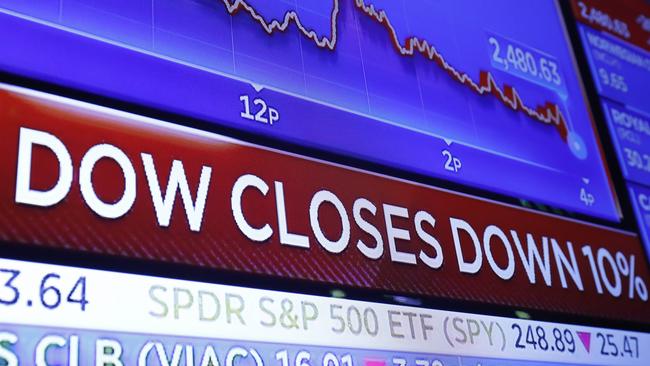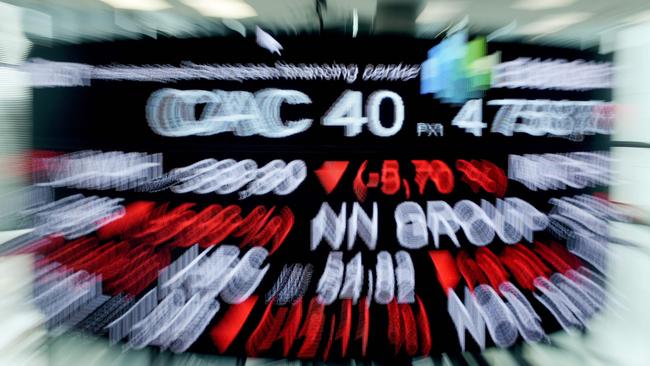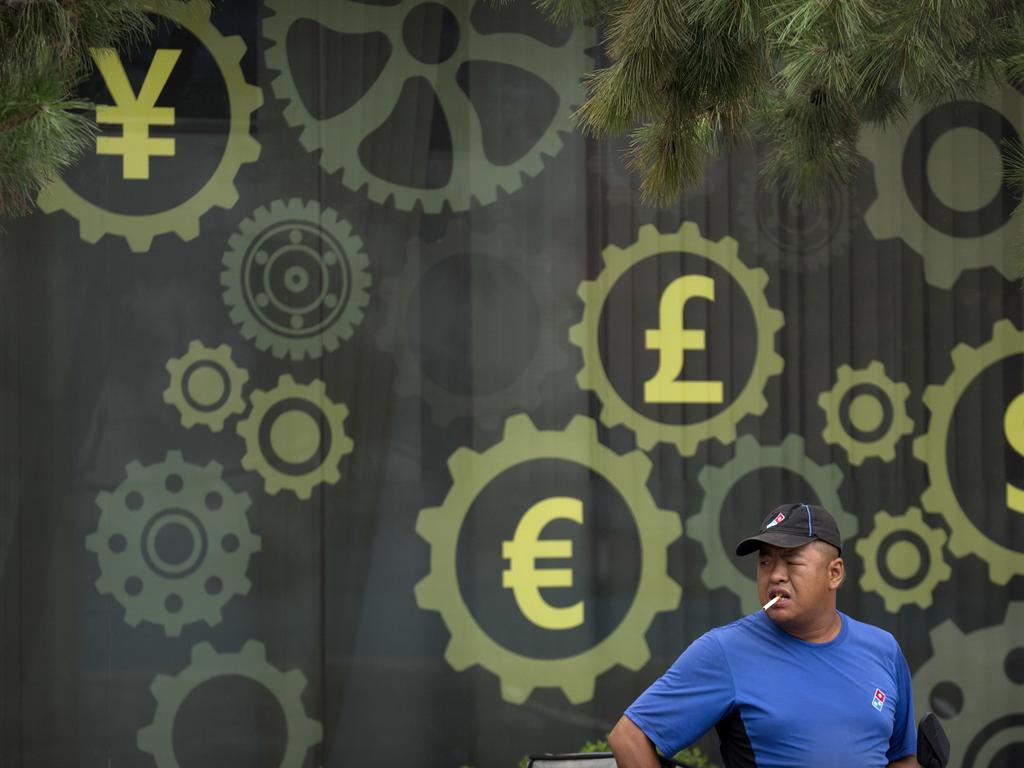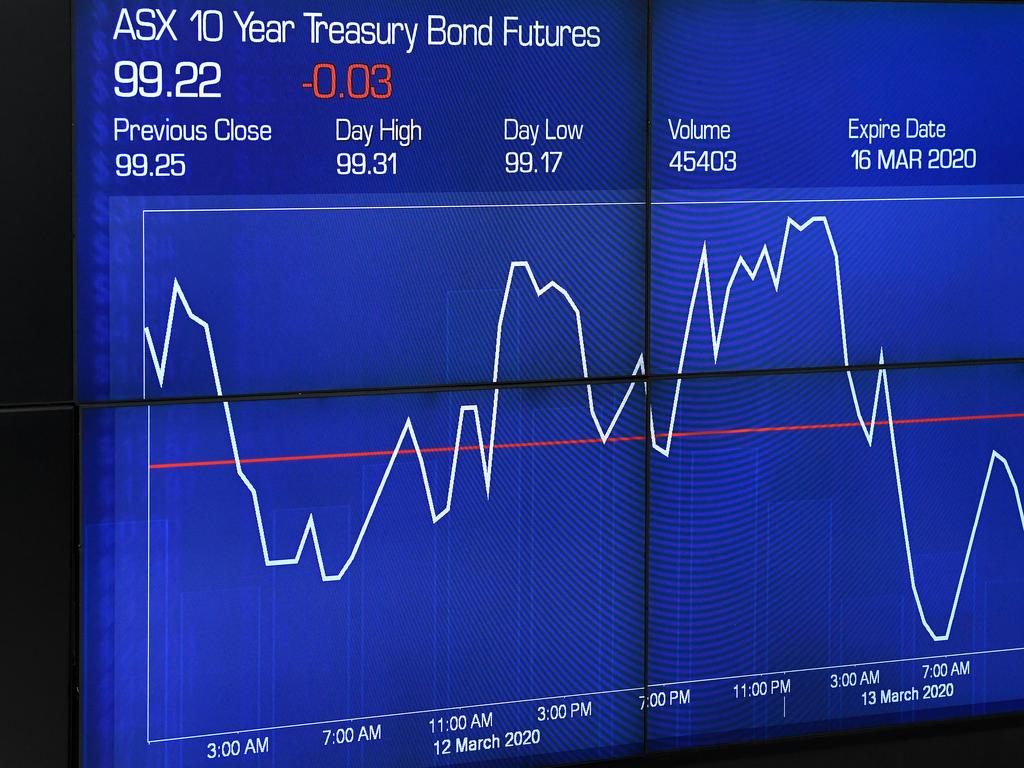
Walking into a television studio early Friday morning, it happened again. Someone I don’t know popped up and asked: “How bad is this? Should I switch my super to cash?”
Once upon a time, you could answer this easily by saying, “check your statement at Christmas”.
Of course, back then, you only got a super statement once a year.
Just now, those antiquated arrangements would go a long way to calming wider fear among investors.
For better or worse, you can now see your super churn daily online and it does nothing whatever to reassure people this virus is - financially - no more than a major economic interruption.
A typical balanced super fund will now be down more than 5.5 per cent year to date - last year most funds did 10 per cent or better (using the median returns for balanced funds).
For active investors and those running self-managed super funds, outcomes will be different. Each portfolio will have its own story.
Most likely, self-directed investors will have been hit harder in the sharemarket slide, but then they will probably have much more in cash.
Faced with this shock, investors don’t need noise, they need perspective.
At the beginning of this hair-raising downturn a note came in from the stockbroker Ord Minnett. It said “a 5 to 10 per cent correction cannot be ruled out, but a bear market is unlikely”. The view held by Ord Minnett was commonplace at the time.
Around the same time, I asked several of the most conservative expert “value investors” who I know to take a shot at how much - at worst - the market could fall.
“Thirty per cent,’’ was the consensus answer. At one point on Friday, the ASX had dropped 32 per cent from top to bottom.
What will happen next? Nobody knows the answer.
Consider Commonwealth Bank - the best capitalised, biggest bank in a protected oligopoly where bank deposits are guaranteed by the government - it went under $60 on Friday down from $90 last month.
Or try to make sense of the sell-off in property trusts - Mirvac fell from $3.40 to $2.40 in the immediate aftermath of interest rate cuts.
What is happening? I got the best answer of the week from Mike Aked, he is the country research director for the US group Research Affiliates.
“It’s all about liquidity. That’s the immediate driver here, don’t look for deeper explanations,” he says.
Aked says investors are pulling money out of the most liquid of all investment classes - the sharemarket. In many cases the plan will be to decide later what to do with the cash.
Moreover, this dash for cash is universal - it’s the one thing the most optimistic and pessimistic have in common. At one end of the spectrum, there are traders getting crunched on margin calls. At the other end, there are logical long-term players who want to have the cash that will allow them to go back into the market at bargain levels.
In this atmosphere, serious investors who are neither bears nor bulls, just pragmatists, are doing the best they can to deal with panicked traders.
Veteran fund manager Geoff Wilson said that ultimately this panicked market is going to offer “phenomenal buying opportunities”. I don’t doubt that for a moment.
But first this panic must pass and the problem so far is that share selling has been indiscriminate, and that means the risk of a wider sell off across all assets is now a distinct danger.
As investors, we have windows into the level of fear across the market and the consequent direction of this drama as it plays out for investors.
The first thing we are going to see is the cancellation of floats, raising and major takeovers. The early evidence is already mounting: NAB has cancelled a hybrid raising. Indeed the Wilson Asset Management group cancelled a share purchase plan on Friday.
As the volatility indices continue at fever pitch violent movements will be the order of the day - on Friday the market fell more than 8 per cent and then shot back higher to close more than 4 per cent higher.
In no particular order, similar flash points are US junk bond markets, European banks, over-leveraged growth-focused tech companies and private equity funds that will almost certainly have the IPO window closed to them in the months ahead.
The other classic signal is gold - moving up steadily each week - now up 35 per cent in Australian dollars over the past 12 months.

It’s worth pointing out that in the global financial crisis (GFC) gold did not really take off until months after the markets reached their bottom in 2009, and the post-GFC peak did not come until three years later in 2012.
To put that another way, gold did not really become the repository of the fearful investor until the markets had done their worst. It’s worth keeping that in mind in the days ahead whether we see a bounce in the wider market or not.
Let’s be clear, “normal” day-to-day market activity - where the market can move 10 per cent in a day either direction - will not return to a conventional pace until these signals settle.
Watch these windows, assume those IPOs and takeovers get postponed in the week and consider joining the gold rush in a limited fashion.
But know, too, that panic always abates; the sharemarket always beats all other assets classes over the long term.
As for switching your super to cash, that’s the easiest thing in the world. But history suggests you will pay dearly in the long run.
Alex Silva at SuperRatings says: “If you put $100,000 into cash at the bottom of the GFC and stayed there your balance would now be close to $90,000 behind the median balanced fund.”
So just ask yourself before you do it, how will you time your entry back into the market? You have to get that right or you are no longer an investor. If you know the answer let me know.








In a hyperactive bear market, instant answers are always going to be dangerous. But investors will demand them.